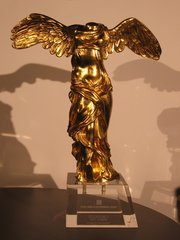Creative Commons
|
|
CreativeCommonsSomeRights2.png
The Creative Commons (CC) is a non-profit organization devoted to expanding the range of creative work available for others to legally build upon and share.
| Contents |
Aim
The Creative Commons website enables copyright holders to grant some of their rights to the public while retaining others, through a variety of licensing and contract schemes, which may include dedication to the public domain or open content licensing terms. The intention is to avoid the problems which current copyright laws create for the sharing of information.
The project provides several free licenses that copyright holders can use when they release their works on the web. They also provide RDF/XML metadata that describes the license and the work to make it easier to automatically process and locate licensed works. They also provide a 'Founder's Copyright' [1] (http://creativecommons.org/projects/founderscopyright/) contract, intended to re-create the effects of the original U.S. Copyright created by the founders of the U.S. Constitution.
History
The Creative Commons licenses were predated by the Open Publication License (OPL) and the GNU Free Documentation License (GFDL). The GFDL was intended mainly as a license for software documentation, but is also in active use by non-software projects such as Wikipedia. The OPL is now largely defunct, and its creator suggests that new projects not use it. Both the OPL and the GFDL contained optional parts that, in the opinions of critics, made them less "free." The GFDL differs from the CC licenses in its requirement that the licensed work be distributed in a form which is "transparent," i.e., editable using open-source software.
Creative Commons was officially launched in 2001. Lawrence Lessig, the founder and chairman of Creative Commons, started the organization as an additional method of achieving the goals of his Supreme Court case, Eldred v. Ashcroft. The initial set of Creative Commons licenses was published on December 16, 2002. [2] (http://creativecommons.org/press-releases/archive/2002/12/) The project was honored with the Golden Nica Award at the Prix Ars Electronica in the category "Net Vision" in 2004.
Localization
The main Creative Commons licenses are written with the U.S. legal model in mind, and therefore the wording may not mesh perfectly with existing law in other countries. Using the U.S. model without regard to local law could render the licenses unenforceable, so the iCommons (International Commons) project intends to fine-tune the Creative Commons legal wording to the specifics of individual countries. As of August 24, 2004, representatives from 21 countries and regions have joined this initiative (http://www.creativecommons.org/projects/international).
Projects and works using Creative Commons licenses
Several million pages of web content use Creative Commons licenses. For some time, Common Content (http://www.commoncontent.org) attempted to maintain a catalog, but it is no longer actively maintained.
Some of the best-known CC-licensed projects and works include:
- The fiction of Cory Doctorow
- Professor Lessig's 2004 book, Free Culture (the first CC-licensed book released by a major mainstream publisher, Penguin Books)
- Groklaw
- MIT OpenCourseWare - academic course syllabi
- Three of Eric S. Raymond's books, The Cathedral and the Bazaar (the first complete and commercially released book under a CC license, published by O'Reilly & Associates), The New Hacker's Dictionary, and The Art of Unix Programming (all three with added proviso)
- Public Library of Science
Record labels
- LOCA Records
- Magnatune
- Opsound
- Krayola Records
- Fading Ways Music
- Thinner/Autoplate (http://www.thinnerism.com)
Tools for discovering CC-licensed content
- iRATE radio
- Gnomoradio
- Yahoo! Creative Commons Search (http://search.yahoo.com/cc)
See also
External links
- The creativecommons.org website (http://creativecommons.org/)
- A short Flash animation describing Creative Commons (http://mirrors.creativecommons.org/)
- International Commons: Creative Commons initiatives outside the United States (http://www.creativecommons.org/projects/international)
- The Commons: The Commons as an Idea - Ideas as a Commons (http://www.freesoftwaremagazine.com/free_issues/issue_01/commons_as_ideas) Article by David M. Berry about the commons and ideas
- BBC to Open Content Floodgates The BBC's Creative Archive project (http://www.wired.com/news/culture/0,1284,63857,00.html?tw=wn_tophead_4)
- Creative Commons: Let’s be creative together (Framasoft) (http://www.framasoft.net/article2389.html)
- Remix Group on Flickr (http://www.flickr.com/groups/remix/) - imaginative reuses of Creative Commons images
- Yahoo Creative Commons Search (http://search.yahoo.com/cc)
References
Ardito, Stephanie C. "Public-Domain Advocacy Flourishes." Information Today 20, no. 7 (2003): 17,19.
Asschenfeldt, Christiane. "Copyright and Licensing Issues—The International Commons." In CERN Workshop Series on Innovations in Scholarly Communication: Implementing the Benefits of OAI (OAI3), 12-14th February 2004 at CERN, Geneva, Switzerland. Geneva: CERN, 2004. http://agenda.cern.ch/askArchive.php?base=agenda&categ=a035925&id=a035925s5t6/ video
Brown, Glenn Otis. "Academic Digital Rights: A Walk on the Creative Commons." Syllabus Magazine (April 2003). http://www.syllabus.com/article.asp?id=7475
———. "Out of the Way: How the Next Copyright Revolution Can Help the Next Scientific Revolution." PLoS Biology 1, no. 1 (2003): 30-31. http://www.plosbiology.org/plosonline/?request=get-document&doi=10.1371%2Fjournal. pbio.0000009
Chillingworth, Mark. "Creative Commons Attracts BBC's Attention." Information World Review, 11 June 2004. http://www.iwr.co.uk/iwreview/1155821
Conhaim, Wallys W. "Creative Commons Nurtures the Public Domain." Information Today 19, no. 7 (2002): 52, 54. http://www.infotoday.com/newsbreaks/nb020603-2.htm
"Delivering Classics Resources with TEI-XML, Open Source, and Creative Commons Licenses." Cover Pages, 28 April 2004. http://xml.coverpages.org/ni2004-04-28-a.html
Denison, D.C. "For Creators, An Argument for Alienable Rights." Boston Globe, 22 December 2002, E2.
Ermert, Monika. "Germany Debuts Creative Commons." The Register, 15 June 2004. http://www.theregister.co.uk/2004/06/15/german_creative_commons/
Fitzgerald, Brian, and Ian Oi. "Free Culture: Cultivating the Creative Commons." (2004). http://eprints.qut.edu.au/archive/00000122/
Johnstone, Sally M. "Sharing Educational Materials Without Losing Rights." Change 35, no. 6 (2003): 49-51.
Plotkin, Hal. "All Hail Creative Commons: Stanford Professor and Author Lawrence Lessig Plans a Legal Insurrection." SFGate.com, 11 February 2002. http://www.sfgate.com/cgi-bin/article.cgi?file=/gate/archive/2002/02/11/creatcom.DTL
Schloman, Barbara F. "Creative Commons: An Opportunity to Extend the Public Domain." Online Journal of Issues in Nursing, 13 October 2003. http://www.nursingworld.org/ojin/infocol/info_12.htm
Stix, Gary. "Some Rights Reserved." Scientific American 288, no. 3 (2003): 46. http://www.sciam.com/article.cfm?chanID=sa006&colID=7&articleID=000C2691-4F88-1 E40-89E0809EC588EEDF
Weitzman, Jonathan B., and Lawrence Lessig. "Open Access and Creative Common Sense." Open Access Now, 10 May 2004. http://www.biomedcentral.com/openaccess/archive/?page=features&issue=16ca:Creative Commons cs:Creative Commons da:Creative Commons de:Creative Commons es:Creative Commons fr:Creative Commons he:Creative Commons hu:Creative Commons it:Creative Commons ja:クリエイティブ・コモンズ nl:Creative Commons no:Creative Commons pl:Creative Commons fi:Creative Commons simple:Creative Commons zh-cn:创作共用

